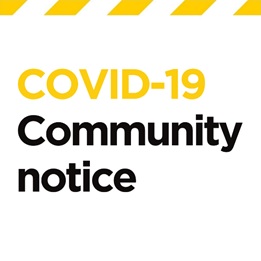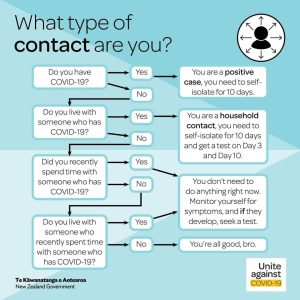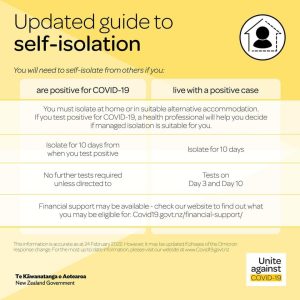Kia ora e te whānau
Once again we have had a change to the settings about COVID-19. This message is a summary of how these changes affect schools. Most of this message comes from the Ministry of Education, based on public health advice.
Only days after I wrote to say the close contact rules have changed, they have changed again, because of the much larger numbers of daily cases. It is reassuring to hear that those that are well protected have much less chance of getting COVID-19 and even less chance of getting really sick.
With Phase 3 of the Omicron response, the key change is that it is only confirmed cases and their household contacts who need to self-isolate. Everyone else, including those who may have had close contact with the case but aren’t in the household, must continue to monitor really closely for any symptoms of COVID-19. The effect of this change is, any staff or students that have previously been considered close contacts outside the home, and who as not showing any symptoms, no longer need to self-isolate. As of Friday 25 February (tomorrow), they can return to school. We really appreciate how well our community is keeping us informed.
While we no longer need to identify close contacts at school, we do need to report any positive cases. If anyone in your family is confirmed as having COVID-19, you will be asked to notify your close contacts yourself. Please get in touch with us as soon as you can if your child has symptoms and especially if they test positive for COVID-19. Please advise if your child is a household close contact.
As I mentioned the other day, it is only natural, as cases in our community increase, they will appear in our school. While the settings have changed the things we are doing – wearing masks, keeping our distance from each other, practising good hygiene habits, and keeping gatherings limited – will stay the same. This is to keep any spread of the virus – should it appear – to a minimum.
You may have seen Dr Jin Russell in the media noting research from New South Wales about their recent Omicron outbreak showing that spread within the school setting is very low (less than 4% of cases at school infected someone else when at school).
We have seen that in New Zealand too. Most infections are happening in households and that helps explains the changes to the settings, along with the huge impact on essential services and workplaces.
This is why schools remain open at Red. We know coming to school is good for wellbeing and learning – to be at school with friends and school staff. It is good for our community to be open, as parents/caregivers need to work and look after younger children.
Your role remains the same, too: please continue to keep a really close watch on your whānau for anyone with symptoms. If unwell, please stay at home and get a COVID-19 test. Rapid antigen tests (RATs) are now being used to diagnose COVID-19 as well as PCR tests. This means that you will get an almost immediate test result back if a RAT is used, to give you peace of mind, or to self-isolate.
Transmission of COVID-19 is still most likely to happen in your home – so please keep doing all those good things to keep your whānau safe. Wash your hands, get lots of fresh air, cover any coughs and sneezes, clean surfaces regularly, and seek advice if anyone is not feeling well. And please wear a mask when you are out and about. There is information online to help your family prepare to isolate if you need to.
The most important advice we can give to keep your whānau safe is to act as if you have COVID-19. More than a third of people who have COVID-19 will not have any symptoms if they have had three doses of the vaccine. Please think about who you visit and what health measures you can put in place to keep everyone as safe as possible.
Getting three doses of the vaccine will really help you to do that. Research has shown that compared with being unvaccinated, three doses of the vaccine will mean you are 67% less likely to be infected with Omicron and 97% less likely to get Delta. If you can’t get COVID you can’t pass it on.
Finally, we know how hard the impacts on COVID-19 have been for many families in New Zealand. If you know of a family in your community who is struggling, please encourage them to reach out for support for example to access food, medicine, or access financial support: Help is available – COVID-19 Health Hub.
If you have any concerns about sending your child to school, please do get in touch. We are here to help.
Aku mihi,
Michael Hart
Tumuaki/Principal






